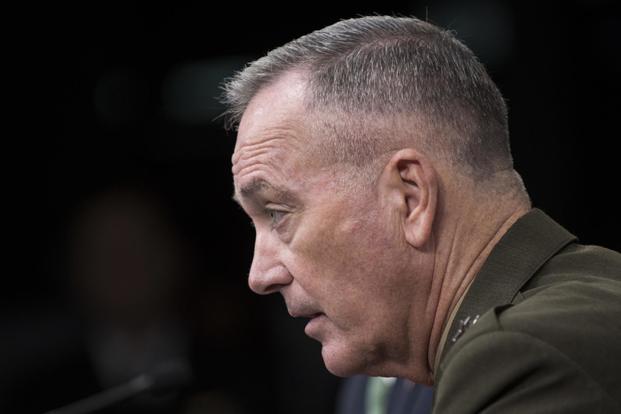Joint Chiefs Chairman Gen. Joseph Dunford arrived in Ankara on Monday to join a delegation led by National Security Adviser John Bolton to warn NATO ally Turkey against attacking the U.S.-backed Syrian Democratic Forces.
Dunford has maintained contact with Gen. Yasar Guler, chief of the Turkish General Staff, and Turkish Defense Minister Hulusi Akar and was expected to meet with both following what appeared to be a major shift on the withdrawal plan outlined over the weekend by Bolton.
Both Guler and Akar have echoed Turkish President Recep Tayyip Erdogan's intention to wipe out the Syrian Kurdish YPG (People's Protection Units), the main fighting force within the SDF, in the effort to eliminate the last remnants of the Islamic State in Syria
Immediately following U.S. President Donald Trump's surprise announcement Dec. 19 via Twitter that U.S. troops in Syria would be withdrawn, Akar said that the Turkish military was preparing "intensely for a counter-terrorism military operation" against the YPG in northeastern Syria.
"Whatever they dig, be it trenches or tunnels, when the time comes, they will be buried in the trenches that they dug," Akar said of the YPG, according to Turkey's state-run Anadolu news agency.
In his last contact with Guler a week before Trump's withdrawal announcement, Dunford defended the presence of observation posts set up by U.S. troops in northern Syria.
Dunford and Guler discussed "the U.S. observation posts in the northeast Syria border region, which were established to address Turkish security concerns," according to a Dec. 14 release from the Joint Chiefs.
Pentagon officials on Monday declined to discuss the current status of the observation posts.
In late November, at an informal session with Pentagon reporters, then-Defense Secretary Jim Mattis said he had ordered the observation posts be set up to "track any threat we can spot going up into Turkey." He also acknowledged that the posts served the dual purpose of protecting the YPG from the Turkish military.
"What this is designed to do is make sure that the people we have fighting down in the MERV [Middle Euphrates River Valley] are not drawn off that fight, and that we can crush what's left of the geographic caliphate," he said.
Mattis said the Turks "don't like our relationship" with the YPG, "and I understand where they're coming from. But we do not say that YPG is the same as PKK."
He referred to Turkey's charge that the YPG is allied with the PKK (Kurdistan Workers Party), considered a terrorist group by the U.S., Turkey and the European Union.
In an op-ed posted in The New York Times late Monday, Erdogan said that Turkey is prepared to take over the U.S. role in Syria to inflict a lasting defeat on ISIS and ensure stability in the region, thus protecting Washington's interests.
"Turkey, which has NATO's second-largest standing army, is the only country with the power and commitment to perform that task," Erdogan said, according to the Anadolu news agency.
Akar said the U.S. misunderstood Turkey's threat to invade eastern Syria. Akar told Anadolu that the "fight of the Turkish Armed Forces (TSK) is not against our Kurdish brothers with whom we have shared the same geography and the same bread for centuries."
"Our struggles in the region are against the PKK/YPG and Daesh [ISIS] terrorists that threaten all ethnic and religious groups, particularly our Kurdish, Arab, and Turkmen brothers," Akar said.
In a news conference in Jerusalem with Prime Minister Benjamin Netanyahu on Sunday, and in earlier remarks with reporters traveling with him, Bolton appeared to put conditions on a U.S. troop withdrawal from Syria that would indicate a lengthy continued presence for the U.S. military.
He said the U.S. would remain in Syria to eliminate ISIS and also to guarantee the safety of the SDF in establishing security in the region. "The timetable [for the withdrawal] flows from the policy decisions that we need to implement," Bolton said.
On Sunday, in response to questions on the White House lawn, Trump insisted that he never called for a rapid withdrawal. However, on Dec. 19, he wrote: "Our boys, our young women, our men, they're all coming back and they're coming back now."
-- Richard Sisk can be reached at Richard.Sisk@Military.com.














